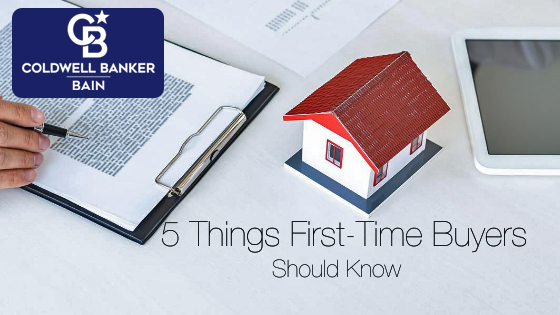
Buying a home is still a part of the American dream. If that’s where you find yourself today, then here are five tips prepared by the experts at Coldwell Banker Bain that you should know before moving forward.
Buying your first home can, of course, be a stressful process, and the more you know going in, the better off you’ll be. Our brokers are always here to help. Here’s what most first-time homebuyers wish they had known before starting the process:
- You’re not buying for the life you have today
It’s one thing to buy a house that fits your current lifestyle. It’s quite another to buy a house that fits your lifestyle five, ten, or twenty years for now. But a house is one of the biggest purchases you’ll ever make, and you must think about it in the long term. Ask yourself some questions about what will your life look like down the road and whether the house you’re looking at will be right for it. Are you planning on getting married or having kids? How long do you expect to be at your current job? If you’re not confident that your house will still be the right house in a few years, you may want to keep looking. - It’s OK to shop around for a mortgage
A lot of first-time homebuyers are so worried about whether or not they’ll be able to secure a mortgage that they take the first offer they get. Less than half of today’s buyers shop around for a home loan. That’s a big mistake, and it’s one that could end up costing you a lot of money. Rates offered by lending institutions vary widely, which is one of the reasons why it’s important to always talk to multiple lenders. As a general rule, it’s best to speak with at least three lenders and a mortgage broker before you make any commitments. - Buy what you can afford
Buy what you can afford might seem like obvious advice, but keep one thing in mind: the amount you can afford isn’t necessarily the same as what your mortgage lender thinks you can afford. Many homeowners get pre-approved for more than they end up spending, and that’s not a bad thing. While pre-approval for a mortgage is a great step toward determining your budget, it shouldn’t be the only one. You need to do your own math to decide how much you can afford. Factor in all your income and expenses, and keep in mind that you should never put yourself in a position where you’re spending more than 30% of your income on housing. - Don’t get caught up in the superficial
When you’re in the market for homes for sale, it’s important to remember that there’s no such thing as a ‘perfect’ house. That’s why it’s really important not to fixate too much on imperfections, especially small ones that can be easily fixed. If the house is dirty, the walls are an ugly color, or the fixtures are outdated, these are all superficial problems. Start out by making a list of priorities. Write out all your must-haves and would-like-to-haves so you can evaluate any house you look at based on whether it meets your needs. - The right real-estate broker can make all the difference
Some buyers shy away from working with a real estate agent because they’re wary about the cost. But it’s worth remembering that a good buyer’s agent will be working in your best interest. The same can’t be said for the listing agent, who is essentially trying to help their client sell their home for as much as possible. Working with a great agent can actually save you money, but that’s not the only benefit. They will also help you with all of the more complicated or overwhelming parts of buying a house, from working with your lender and negotiating the price to overseeing inspections and signing the closing paperwork.
Buying your first home can seem overwhelming, but it doesn’t have to be. Contact us today to learn more and get started on the road to homeownership.


 Facebook
Facebook
 X
X
 Pinterest
Pinterest
 Copy Link
Copy Link